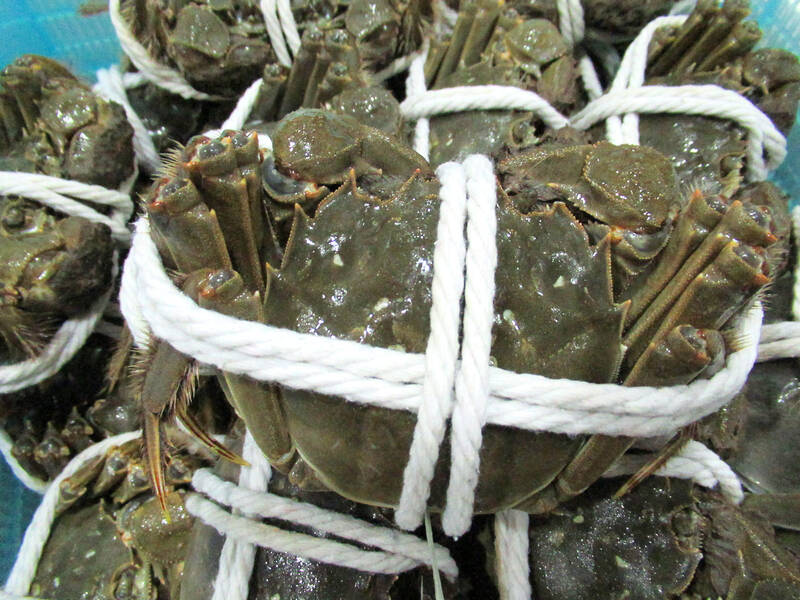A shipment of Chinese mitten crabs from China was found to contain dioxin concentrations 2.6 times higher than the safety limit, the Ministry of Health and Welfare said yesterday.
The 14.7-tonne consignment of tainted crabs was intercepted at the border early last month and had been returned or destroyed before they could reach local markets, it said.
Samples of the crabs showed a dioxin level equivalent to 9.2 picograms per gram (pg/g) wet weight and polychlorinated biphenyl level equivalent to 10.6pg/g, Food and Drug Administration (FDA) Deputy Director-General Lin Chin-fu (林金富) said.

Photo courtesy of the Food and Drug Administration
These values exceeded the safety limits by 2.6 and 1.6 times respectively, he said.
Taiwan had certified 31 China-based aquafarms for exports of Chinese mitten crabs to the nation and failing a safety test would result in decertification, he said, adding that this means the list of authorized importers has dwindled to 16.
Citing FDA regulations, Lin said imported Chinese mitten crabs are tested for 65 types of substances, including veterinary drugs, heavy metals and dioxin.
The crabs can be temporarily stored in designated facilities if testing takes more than five days, he added.
Imported parcels that failed safety inspection are returned to their place of origin or destroyed, Lin said.
The nation’s safety mechanisms for imported Chinese mitten crabs are well-established and the public can safely consume any that had been allowed for sales domestically, he said.
According to Fisheries Agency data, China exported 387.5 tonnes of mitten crabs to Taiwan in 2017 before widely reported scandals involving dioxin contamination in the following year reduced the amount to 200.7 tonnes.
China in 2019 exported 174.3 tonnes of the crabs and more than 250 tonnes each year from 2020 to 2022, when 6.4 tonnes were rejected for containing excessive dioxin levels, and another 211.5 tonnes last year, the records showed.
Experts warn that dioxin consists of 419 chemical compounds and is a confirmed carcinogen.
Short-term exposure to high doses can cause skin disorders and liver damage, while long-term low-dose exposure might increase the risk of cancer, damage the immune system and pose risks to pregnant women, experts said.
Additional reporting by CNA

Chinese Nationalist Party (KMT) Chairman Eric Chu (朱立倫), spokeswoman Yang Chih-yu (楊智伃) and Legislator Hsieh Lung-chieh (謝龍介) would be summoned by police for questioning for leading an illegal assembly on Thursday evening last week, Minister of the Interior Liu Shyh-fang (劉世芳) said today. The three KMT officials led an assembly outside the Taipei City Prosecutors’ Office, a restricted area where public assembly is not allowed, protesting the questioning of several KMT staff and searches of KMT headquarters and offices in a recall petition forgery case. Chu, Yang and Hsieh are all suspected of contravening the Assembly and Parade Act (集會遊行法) by holding

PRAISE: Japanese visitor Takashi Kubota said the Taiwanese temple architecture images showcased in the AI Art Gallery were the most impressive displays he saw Taiwan does not have an official pavilion at the World Expo in Osaka, Japan, because of its diplomatic predicament, but the government-backed Tech World pavilion is drawing interest with its unique recreations of works by Taiwanese artists. The pavilion features an artificial intelligence (AI)-based art gallery showcasing works of famous Taiwanese artists from the Japanese colonial period using innovative technologies. Among its main simulated displays are Eastern gouache paintings by Chen Chin (陳進), Lin Yu-shan (林玉山) and Kuo Hsueh-hu (郭雪湖), who were the three young Taiwanese painters selected for the East Asian Painting exhibition in 1927. Gouache is a water-based

Taiwan would welcome the return of Honduras as a diplomatic ally if its next president decides to make such a move, Minister of Foreign Affairs Lin Chia-lung (林佳龍) said yesterday. “Of course, we would welcome Honduras if they want to restore diplomatic ties with Taiwan after their elections,” Lin said at a meeting of the legislature’s Foreign Affairs and National Defense Committee, when asked to comment on statements made by two of the three Honduran presidential candidates during the presidential campaign in the Central American country. Taiwan is paying close attention to the region as a whole in the wake of a

OFF-TARGET: More than 30,000 participants were expected to take part in the Games next month, but only 6,550 foreign and 19,400 Taiwanese athletes have registered Taipei city councilors yesterday blasted the organizers of next month’s World Masters Games over sudden timetable and venue changes, which they said have caused thousands of participants to back out of the international sporting event, among other organizational issues. They also cited visa delays and political interference by China as reasons many foreign athletes are requesting refunds for the event, to be held from May 17 to 30. Jointly organized by the Taipei and New Taipei City governments, the games have been rocked by numerous controversies since preparations began in 2020. Taipei City Councilor Lin Yen-feng (林延鳳) said yesterday that new measures by